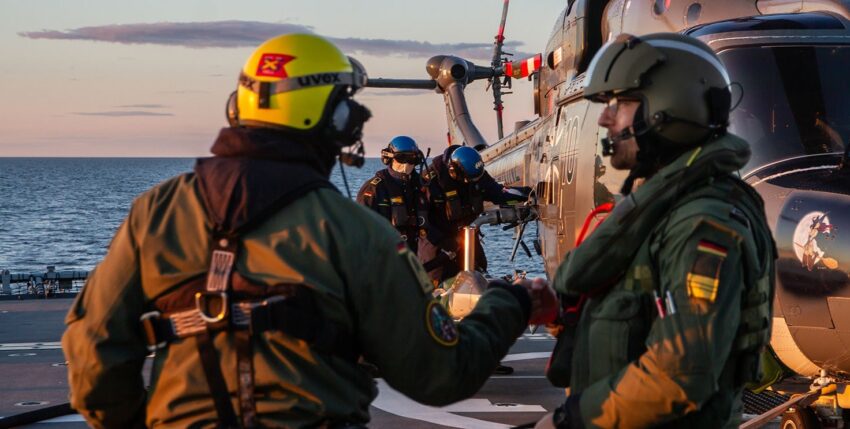This is followed by the second-placed entry in the DMI essay competition by the team of authors Oberleutnant zur See M.Sc. Benedict Warkus and Oberleutnant zur See M.A. Kian Kottke:
The 21st century - a maritime century?
by OLt zS M.A. Kian Kottke and OLt zS M.Sc. Benedict Warkus
Introduction
Naturally, the maritime lobby in Germany, including the navy, defence companies and companies with a connection to seafaring, has a strong interest in highlighting the increasing relevance of the maritime sector for the economy, security, science and society as a whole. The DMI is also committed to this goal. The question posed in the title must also be considered against this background. Is it merely a wish, based essentially on a calculation of interests, or is it a justified, verifiable assumption about future developments? Firstly, however, it is necessary to clarify what is actually meant by the relatively vague term "maritime century". The extent to which the sea is gaining elementary importance for the various relevant areas of life in modern societies, in the sense of opportunities to increase security, knowledge and economic prosperity, but also as a risk factor for these very areas, should serve as a point of reference. These include maritime trade, which has contributed to a worldwide, albeit unevenly distributed, increase in prosperity in the course of globalisation, but is also particularly susceptible to disruption as a sensitive lifeline of the global economy; the use of the sea as a resource base, which has become an increasingly important component of the global economy, but which also entails incalculable environmental and security policy risks; symmetrical and asymmetrical conflicts and instabilities in coastal states also increasingly have a maritime dimension that neither states nor international law (let alone the German Basic Law) have adequately anticipated.
It is clear that the importance of the "maritime factor" should not be underestimated, even if this is not reflected in the political and public discourse in Germany. The question of whether and to what extent the coming decades will bring a significant increase in the relevance of the maritime sector for modern society will be addressed in the remainder of this essay. Firstly, the economic factors in particular will be considered, followed by the security policy risk factors.
Economic factors
The "freedom of the seas" is probably the most common catchphrase used to describe the importance of the sea for trade and prosperity in recent centuries. In the past, free trade routes opened up enormous opportunities for coastal states as well as landlocked countries, which benefited from the enormous turnover of goods by sea. It would make sense to list statistics at this point, but this would be tantamount to a truism and is therefore omitted. German import and export statistics are not the only evidence that the global economy is more interconnected today than ever before, not to mention the massive importance of free sea trade routes. The threat to free sea routes has a significant impact on the economic movement of goods, as can be seen in particular in the Horn of Africa, where not only state-led military operations, but now also private "security services" have to protect the right to free and peaceful use of the sea. Sooner or later, the associated cost increases will also affect the goods on offer in this country, meaning that the "freedom of the seas" has its price, which tends to rise.
However, this "freedom of the seas" is now just one of various factors that manifest the economic importance of the sea. The sea is no longer just a "transport route" but is increasingly becoming an economic asset in its own right. Fishing, which is subject to strict rules, at least in the EU, leads to lasting damage in other regions, e.g. off the West African coast, and thus to permanent damage to the sea as an economic asset. The "Deep Water Horizon" disaster also highlights the risks associated with the development of undersea raw material deposits. The importance of such raw material deposits has increased enormously in recent decades. Manganese deposits in large parts of the Pacific play a role here, as does the increasing development of gas and oil deposits. Due to climatic changes, it is now possible to develop previously unnoticed areas in the Arctic and Antarctic and to fully utilise them within a few years. This in turn raises the problem of which countries gain access to such deposits on the basis of which agreements - a question that now also has the potential for military conflict, for example in the dispute between China and Japan over the Senkaku Islands. The fact is that the economic importance of the sea is already enormous and will continue to grow. If war, according to Clausewitz, is the continuation of politics by military means, then economic factors will undoubtedly be the driving force behind politics in the long term. The sea will therefore not only become an "economic good" from which everyone wants to benefit, but also a strategic factor in the calculations of states.
Security policy factors
In economic terms, a steady increase in the importance of the maritime sector can therefore be expected. However, the vulnerability of modern and globalised societies to maritime threats is also increasing to the same extent.
Nation states around the world seem to have rediscovered the world's oceans as a place for power projection and power struggles. Geopolitics, actually a relic of the Cold War, is experiencing a renaissance and is leading to a maritime build-up in the Indian Ocean and Western Pacific, involving not only India and China, for example, but also numerous other coastal states from South East Asia and Oceania. In many cases, unresolved territorial disputes are the cause of the conflict. In reality, however, it is primarily submarine raw materials that are significant, the exploitation rights of which the states want to secure by asserting their territorial claims. The growing hunger for resources in developing societies will also increase their willingness to engage in conflict - and thus potentially weaken the security of the world's oceans. Brazil, the largest and most influential state in South America, is also expanding its maritime armed forces in order to emphasise its claims to the huge sources of raw materials off the coast and its position as a supra-regional power that projects as far as the Caribbean and West Africa.
In addition to traditional, symmetrical conflict structures, a variety of asymmetrical threats from primarily private actors that are difficult to assess have posed a potential for insecurity for both the use of the sea and the population on land that should not be underestimated in recent years. For example, in the form of piracy, which has made itself felt not only off Somalia, but also on the West African coast and in South-East Asia, or in the form of a diffuse terrorist threat that can be located in critical proximity to important maritime choke points for world trade (e.g. Bab el Mandeb, Suez Canal, Strait of Malacca). The supply of weapons by sea not only favours the conditions for proliferation, but is also capable of fuelling conflicts inland. It is not without reason that units from various Western states patrol the Lebanese coast. The smuggling of people and, above all, illegal drugs across the Mediterranean has also increased significantly in recent years, which has consequences for the internal policies of countries such as Italy and Spain, but also for the EU.
Almost 70% of the world's population lives relatively close to the sea and the influx into economically strong coastal regions continues unabated. Along with an increasingly complex conglomerate of conflicts and instabilities and the sharp decline in the willingness of Western populations (and politicians) to deploy their armed forces on land since the beginning of the last decade, there is a real need to prioritise the potential of maritime security in Germany and Europe. However, in times of omnipresent cuts in defence budgets, it is becoming increasingly difficult to maintain a broad-based maritime force component. The utilisation of synergy effects and cooperation potential at European level could be a solution and would probably be easier for seafarers, who have always been accustomed to international connections, than for land forces.
Conclusion
Looking at the above, the current and future importance of the maritime sector can undoubtedly be recognised. It has also become clear that the sea already plays a special economic and strategic role in the calculations of almost every nation. Therefore, future challenges lie not only in the security of sea and trade routes and protection against piracy. It is undoubtedly of great importance that future maritime challenges are tackled jointly and across national borders. Only in this way can future territorial claims as well as access and mining rights be coordinated fairly under international law and for the benefit of all states. Such an approach is complex and cannot be realised within a few summit meetings. Rather, it requires a cross-national awareness of the existing challenges. And it is precisely in the development of this awareness and the resulting coordinated implementation of binding agreements under international law that the 21st century will become a maritime century. The sea is not only to be understood as an economic and strategic factor; rather, its importance has contributed and continues to contribute to connecting peoples with one another. This must be preserved in the future and it is up to us to shape this future.
OLt z.S. Warkus is a member of crew 7/06, studied political science at the Helmut-Schmidt-University (HSU)/University of the Federal Armed Forces Hamburg and is currently officer of the watch on board the minesweeper "Herten".
OLt z.S. Kottke. is a member of crew 7/07, also studied political science at the HSU Hamburg and is currently officer of the watch on board corvette "Ludwigshafen am Rhein".








2 responses
Is it true that there is a third part to this series?
asks
the sailor
The third article in this series will be published here on Wednesday 19th March!
We will publish the call for entries for this year's essay competition in May.